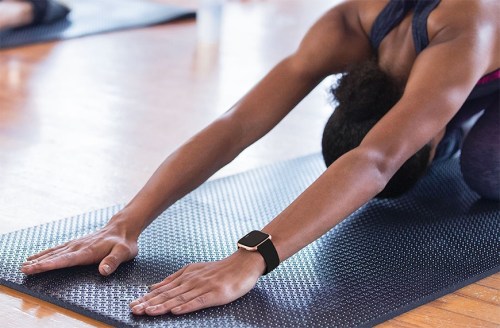Your Fitbit now tracks your period, too
Here's everything you need to know about the new smartwatch and the way its built-in female health technology can help you monitor your menstrual cycle.

Think back to the last time you had a check-up with your OB/GYN. Did she ask you about the first day of your last period? Did you have any idea when that was?
Only the most attentive and organized among us actually know the answer—so no, you’re not alone—and it’s one reason period trackers have gained popularity in recent years. Up to now, though, they’ve all been apps you had to download onto your device; however, Fitbit has just debuted the first built-in option with its latest launch, the Fitbit Versa ($200).
The wearable tech giant’s acknowledgment of menstrual health as a major category worth investing and integrating into its platform is a moment of realness (albeit overdue) that needs to be recognized. Its latest technology allows you to log your cycle dates, record symptoms, compare previous periods, and see how those stats affect the rest of your health and fitness data right in the Fitbit app, as well as on your watch. (And don’t worry, you’re not going to get “Hey, it’s time for your period!” alerts in the middle of a meeting; that info will be discreet, but accessible.)
“In a Fitbit survey, 70 percent of women didn’t know how long an average cycle is, and 80 percent didn’t know that there were multiple phases in a cycle.”—Katharine White, MD.
As any woman who gets her period knows, your menstrual cycle comes with physical and emotional changes that can be downright disruptive—especially if you’re caught off guard…which happens to more women than you might think. “This understanding is sorely lacking,” says Katharine White, MD, assistant professor of obstetrics and gynecology at Boston University. “In a Fitbit survey, 70 percent of women didn’t know how long an average cycle is, and 80 percent didn’t know that there were multiple phases in a cycle,” she adds. The company also said female health tracking was one of the most-requested features on their community boards.
Having this kind of information at your fingertips—or on your wrist—can help you learn what’s normal for you, and knowing that is super important because changes in your period can indicate reproductive health issues like uterine fibroids, ovarian cysts, or even cervical cancer.
Additionally, female health tracking means the next time you visit your doctor you’ll be bringing with you a wealth of data that’ll help them tailor their care to your personal needs. “There’s an amazing dearth of information about healthy women’s menstrual cycles,” says Dr. White. “This is because scientists tend to study diagnoses and diseases; it’s really hard to get a grant to study what’s normal.”
Twenty-four percent of women already use apps to track their periods, according to Fitbit. But its new smartwatch (which looks more like an Apple Watch—it has a larger, square face rather than the bracelet-style design of other iterations) puts all that info in one place and combines it with the rest of your wellness metrics like 24/7 heart rate tracking, on-screen workouts, and automatic sleep stages tracking. All that intel is now available on-device for Fitbit Ionic users, too, and to all Fitbit app users starting in this spring.
Considering the fact that wearable tech was named one of the three biggest fitness trends for 2018 by the American College of Sports Medicine, Fitbit just made a major claim for the top spot in the smartwatch game—especially when it comes to women. Your move, Apple.
Technology may also play a role in helping you sleep, and did you hear? The future of wearable tech may be, literally, at your fingertips.
Sign Up for Our Daily Newsletter
Get all the latest in wellness, trends, food, fitness, beauty, and more delivered right to your inbox.
Got it, you've been added to our email list.










